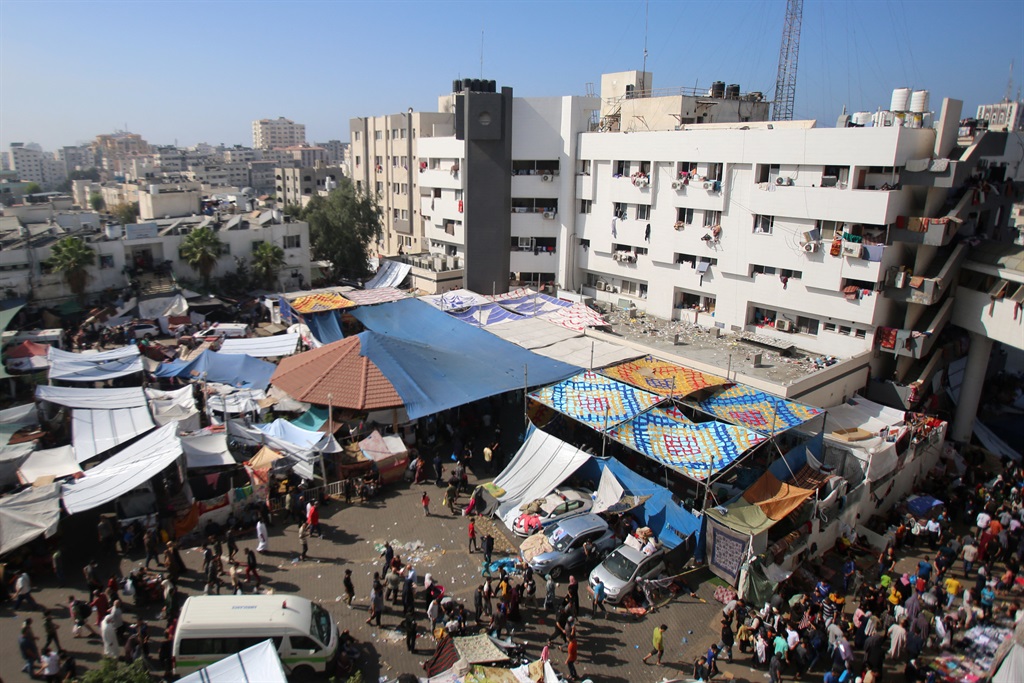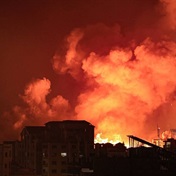
- Heavy rain in Gaza on Tuesday brought new concerns and challenges for Palestinians.
- The rain brought dismay for displaced people who woke to find the clothes they put out to dry the night had been drenched by rain.
- Winters can be wet and cold in Gaza, and the enclave is sometimes hit by flooding.
Heavy rain in Gaza on Tuesday brought new concerns and challenges for Palestinians, many of whom are homeless and living in makeshift tents after weeks of Israel bombardment.
The start of the rainy season and the possibility of flooding increased fears that the densely populated enclave's sewage system would be overwhelmed, and disease would spread.
At a UN shelter in Khan Younis in southern Gaza, the rain brought dismay for displaced people who woke to find the clothes they put out to dry the night had been drenched by rain.
"We were in a house built of concrete and now we are in a tent," said Fayeza Srour, who sought safety in the south after Israel began its military offensive in response to the 7 October rampage by Hamas fighters who entered southern Israel from Gaza.
"The nylon tarps, the tent and the wood will not resist flooding... People sleeping on the floor, what will they do? Where will they go?"
READ | US imposes third round of sanctions on Hamas following attack
Winters can be wet and cold in Gaza, and the enclave is sometimes hit by flooding.
Another displaced Gazan, Karim Mreish, said people at the shelter were praying for the rain to stop.
"Those children, those women, those elderly pray [to] God that it doesn't rain," he said. "If it does, it will be very difficult, and words will fail to describe our suffering."
The World Health Organisation (WHO) said last week that Gaza faced an increased risk of disease spreading because Israeli air bombardments had disrupted the health system, limited access to clean water and caused people to crowd in shelters.
It voiced concern on Tuesday about the prospect of rain causing flooding and overwhelming already meagre and damaged sewage facilities.
"We've already got outbreaks of diarrhea," WHO spokesperson Margaret Harris said in Geneva.
She said there were more than 30 000 cases of diarrhea in a period when WHO would normally expect 2 000 cases.
She said:
Ahmed Bayram, a spokesperson for the Norwegian Refugee Council, said the start of the rainy season could mark "the most difficult week in Gaza since the (military) escalation began."
"Heavy rains will mean more impeded movement for people and rescue teams," he said. "It will make it harder to save people stuck under the rubble or to bury the dead, all of this amid ceaseless bombardment and a fuel shortage catastrophe."
The 'here and now'
Israel vowed to wipe out Hamas after the 7 October attack, in which Israel said at least 1 200 people were killed and about 240 were taken hostage. Medical officials in Hamas-run Gaza say over 11 000 people have been killed in Israeli strikes since then.
Facing the daunting scale of the humanitarian needs of Gaza's 2.3 million people, aid organisations have been unable to plan for the challenges posed by rain and flooding.
Juliette Touma, Director of Communications at the UN Palestinian refugee agency, said the organisation was focused on meeting the population's needs "here and now."
"We're barely able to make it from one hour to the next ourselves because the situation on the ground is so desperate," she said.
Touma said just a small amount of rain could cause the streets of Gaza to flood, given the sewage system's inability to absorb water.
"This is on a normal day. This is not when half of Gaza, if not more, is in rubble," she said.
The International Committee of the Red Cross (ICRC) said it had also been unable to plan far beyond Gazans' daily needs.
"The situation is so volatile and complicated as a result of the hostilities that we have focused really squarely on the humanitarian consequences as they shift from one day to the next," said William Schomburg, head of the ICRC delegation in Gaza.




 Publications
Publications
 Partners
Partners























